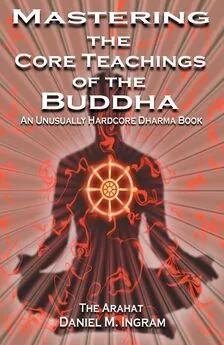Daniel Ingram - Mastering the Core Teachings of Buddha - An Unusually Hardcore Dharma Book
- Название:Mastering the Core Teachings of Buddha - An Unusually Hardcore Dharma Book
- Автор:
- Жанр:
- Издательство:Aeon Books
- Год:2009
- ISBN:9781904658405
- Рейтинг:
- Избранное:Добавить в избранное
-
Отзывы:
-
Ваша оценка:
Daniel Ingram - Mastering the Core Teachings of Buddha - An Unusually Hardcore Dharma Book краткое содержание
Mastering the Core Teachings of Buddha - An Unusually Hardcore Dharma Book - читать онлайн бесплатно полную версию (весь текст целиком)
Интервал:
Закладка:
Training in morality also cultivates some of the Seven Factors of Enlightenment, though in a less formally meditative way. In order to work well in the ordinary world, it is very helpful to be mindful of what we are doing, saying and thinking and also what effects these produce in the world so that we can consciously work to craft the life we want to lead as best we can. It is helpful to exert energy as we craft our life for obvious reasons. We can also cultivate tranquility, the ability to not take life too seriously, to relax, finding that balance of focus and ease that makes for a good life. We can learn to concentrate on staying on track with our tasks, goals and aspirations, though in this case concentration is 50
The Seven Factors of Enlightenment
more like a form of discipline than the concentration of formal meditation, though discipline of action, speech and mind is vital for the other two trainings. Finally, we can learn that we cannot get rid of all of the bumps on our road, so having the shock absorbers of equanimity, the ability to stay spacious and accepting of what happens, is also very helpful for crafting a good and healthy life.
51
7.THE THREE TRAININGS REVISITED
The Three Trainings provide a great framework for thinking about spiritual work, a framework that can help us maintain a clear and empowering way of thinking about what we are doing. In this chapter, I will discuss many important aspects of the spiritual path and use the Three Trainings, actually the scope of each of the Three Trainings, to provide an easy and powerful way of dealing with these complex topics.
Just to review, the scope of the first training, which I call morality, is the ordinary world, the conventional world, the world that we are all familiar with before we even consider more specialized topics such as meditation. The goal is to act, speak and think in ways that are conducive to the welfare of yourself and others. The scope of the second training, concentration or depths of meditation, is to focus on very specific and limited objects of meditation and thus attain to specific altered states of consciousness. The scope of the third training, that of insight or wisdom, is to shift to perceiving reality at the level of individual sensations, perceive the Three Characteristics of them, and thus attain to profound insights into the nature of reality and thus realize stages of enlightenment.
First, I will consider happiness in the context of scopes of the Three Trainings. As training in morality is such a vast subject, the ways we can find happiness is also a vast subject, and becomes interesting primarily in comparison to the other two training’s scopes, those of concentration and wisdom. The common denominator of the concentration
attainments is that we learn to get ourselves into states of consciousness that are some mixture of blissful and peaceful, as well as increasingly spacious and removed from our ordinary experience. These can be a source of happiness that is far more intense and reliable than the happiness found in the ordinary world. Being able to access as much happiness and peace as we wish when we wish reduces our anger at the world from not providing us with these, making us less needy and greedy. There is also the happiness that comes from seeing the true nature of the sensations that make up our world and thus attaining to stages of realization or enlightenment.
There are three areas of renunciation that correspond to the scopes of the Three Trainings. We can renounce aspects of the ordinary world
The Three Trainings Revisited
by simply abandoning these things. We can quit our job, leave our relationship, stop smoking crack, and shave our heads. We can try to be less angry or fearful. We can work on our communication skills, trying to avoid lying and slander. Some of these may be easier than others, and some of these may be helpful and some not, but the important point here is that these sorts of forms of renunciation are, for better or for worse, renunciation of aspects of the ordinary world within the context of the first training’s scope. Or, we can renounce renouncing these things and do them. Renunciation is a very arbitrary concept when applied to the first training.
There is also the renunciation that comes from being willing and able to attain the temporary concentration attainments. We are willing to spend some time removed from the ordinary experience of the world and enter into states where the ordinary world becomes more and more removed from us. It is usually not that hard to convince people that there may be occasions when having the ability to renounce the ordinary world in this way for some period of time could be advantageous. We can all imagine taking a little bliss break and finding it helpful in some appropriate context.
There is also the type of renunciation associated with insight practices, in which one is willing to break from the gross conceptual way of working that is helpful for the scope of the ordinary world, break from the more restricted and refined conceptual way of working that is necessary to attain stable altered states of consciousness, and move to perceiving sensations individually and directly, seeing the true nature of them. This is a much more subtle and sophisticated form of
renunciation than the other two, and it is not always easy to convince people that having this option open to them is a good idea.
While “enlightenment” generally sounds very appealing, it suddenly sounds strange in the context of seeing all sensations as being utterly transient, a source of pain if we make artificial dualities out of them, and not self. People often mix up the three kinds of renunciation, the most common error being that they imagine that they must “give up” aspects of the first two trainings (a happy life and fun concentration states) in order to renounce them in the insight way, in which they see the true nature of the sensations that make up these things. They imagine that 53
The Three Trainings Revisited
they must give up their job or relationship in order to see its true nature, or imagine that they must not enter into high states to see their true nature. This basic conceptual error causes many of the problems that people find on the spiritual path. That brings me to the three forms of suffering.
First, there is the form of suffering that the Buddha is most famous for talking about, ordinary suffering, the standard list including such things as birth, sickness, old age, death, lamentation, pain, grief and despair. These are ordinary forms of suffering that we can try to mitigate as best we can by ordinary methods, i.e. by working within the scope of the first training, i.e. the conventional world. I am a big fan of trying to find worldly happiness so long as we do not neglect the importance of the other two trainings. There is also the form of suffering relating to the scope of the second training that comes from being limited to our ordinary state of consciousness, with our only way out coming from sleep or the use of chemical substances. We yearn for bliss that is not so bound up in things like whether or not we get a good job, for experiences like those found in the concentration states. Our minds have this potential, and the failure to be able to access these states at times when doing so would be helpful and healthy is a source of bondage. I am a big fan of being able to attain these wonderful states so long as we do not neglect the other two trainings.
There is also the kind of suffering that comes from making artificial dualities out of non-dual sensations, and all of the unnecessary reactivity, misperceptions, distortions of perspective and proportion, and basic blindfulness that accompanies that process. This kind of suffering, relating to the scope of training in wisdom, is not touched by the first two trainings, and thus forms a background level of suffering in our life and also increases the potential for further suffering in the other two scopes. This form of suffering is gradually relieved by the stages of enlightenment, as fewer and fewer aspects of reality have the capacity to trick the mind in this way. I am a big fan of awakening and thus eliminating this pervasive form of suffering, just as long as we do not also neglect the other two trainings.
The suffering of the ordinary world can be extremely unpredictable, and working to relieve it is a very complex business, the work of a 54
The Three Trainings Revisited
lifetime and perhaps an eternity. The suffering related to being unable to access refined altered states of consciousness is mitigated by simply taking the time to learn the skills necessary and then refining them until they are accessible to us when we wish. There are limits to these states, and so the basic states attainable by training in concentration can be very thoroughly mastered within a lifetime and even within a few years or perhaps months for those with talent and diligence. The stages of enlightenment are permanent, and once they are attained, that aspect of our suffering is forever eliminated and never arises again. This can be accomplished by those who take the time to learn the skills necessary to see individual sensations clearly and are willing to work on that level.
These basic facts can be used to help us plan our quest for
happiness and the elimination of the various forms of suffering in our life. We can direct our studies, our training, and work on specific skills that lead to specific effects and abilities in the order we choose, within the limits of our life circumstances and the resources available to us. For instance, it might make sense to learn concentration skills early in our life, as they cultivate so many of the skills necessary for the other two trainings and can provide increased sense of ease and wellbeing. For example, rather than popping a cold beer at the end of a hard day, we could bathe our body and mind in as much bliss and peace as we can stand for as long as we wish. If we master concentration practices, we have the option to make such choices.
It might also make sense to work on insight practices early rather than later so as to reduce the amount of time during our life that we live with the fundamental suffering caused by the illusion of duality. There is only so much we can do to prevent ordinary suffering for ourselves and others, though it is always good to do what we can. Thus, it is also good to realize that we can also reduce and eliminate the other forms of suffering through learning the two basic styles of meditation more easily than we can eliminate much of our conventional suffering.
There are three ways in which words such as “enlightenment” are used, and these may also relate to the scopes of the Three Trainings.
However, I feel that this is a dangerous habit, and I strongly advocate using enlightenment and similar words to refer only to ultimate insights, meaning the stages of awakening in the high and traditional sense.
55
The Three Trainings Revisited
While we may hear people speak of committing “enlightened” actions, or of thinking in “enlightened” ways, I have come to the conclusion that for spiritual training we either need to be very careful to explain that these are very conventional and relative definitions of enlightenment or not use such language at all.
Some traditions give some of the very high concentration states an ultimate status. I also advocate strongly against this, as did the Buddha.
These states are so compelling and seductive for some people that they imagine they are enlightened in the non-dual sense when they are merely having temporary unitive or unknowing experiences
(experiences where reality did something that was sufficiently lacking in specific qualities or intensity to be clearly known). Thus, I strongly suggest that such attainments never be associated with the language of enlightenment in any way.
Читать дальшеИнтервал:
Закладка:





![Дженнифер Гюнтер - The vagina book. Главная книга для тех, у кого есть этот орган [litres]](/books/1061538/dzhennifer-gyunter-the-vagina-book-glavnaya-kniga-dl.webp)




